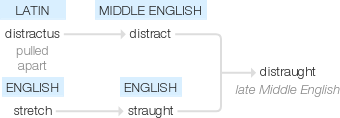Distraught
late Middle English: alteration of the obsolete adjective distract (from Latin distractus ‘pulled apart’), influenced by straught, archaic past participle of stretch.
wiktionary
From Middle English distraught, merger of distract(“distracted”) and straught(“stretched, distraught”), past participle of strecchen(“to stretch”). Compare also bestraught, extraught, forstraught, etc. More at distract, stretch.
etymonline
distraught (adj.)
"distracted, frantic, deranged," late 14c., an alteration of distract (mid-14c.), which in its older form is long obsolete, a past-participle adjective from the Middle English verb distracten or else from Latin distractus "distracted, perplexed," past participle of distrahere "draw in different directions," from dis- "away" (see dis-) + trahere "to draw" (see tract (n.1)).
The Middle English alteration in form is perhaps by association with native past-participle forms in -ght, such as caught, bought, taught, brought. Compare distracted, which is a 16c. past-participle adjective from the same verb after the form of this word shifted.
